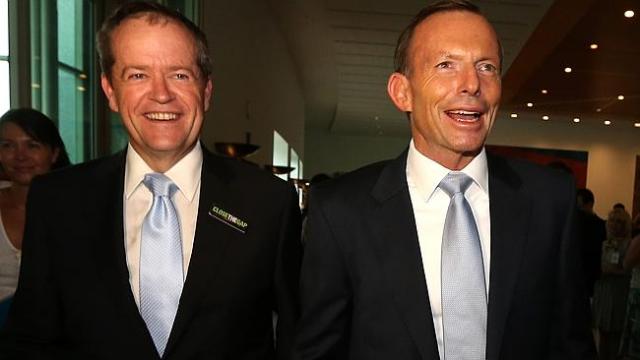Search
Democracy Links
Member's Off-site Blogs
made for each other ....

Bill Shorten, who seemed so impressive as a union leader and minister, is shaping up as the least inspiring opposition leader since Alexander Downer. In foreign affairs, Shorten’s fear of repeating Mark Latham’s mistakes means that he is trying to outbid prime minister Tony Abbott in unquestioning support for bellicosity abroad. In domestic affairs, he has adopted Abbott’s negative style, which may yet trap him.
In joining the Americans in their offensive against Islamic State (IS), and NATO in opposition to Russian president Vladimir Putin, Abbott is back to his familiar script of the “Anglosphere” and the Cold War division between good and evil.
There may well be a case for Australia joining an international campaign to crush IS, but there is also a strong case for a parliamentary debate. It is shameful that Labor voted against one.
Equally, Labor’s unwillingness to question Australia’s unwavering support for Israel, when international opinion was overwhelmingly critical of the scale of its operations in Gaza, suggests a decision to cede any dissent on foreign policy to the Greens. While Labor is unwilling to articulate any alternative views of foreign policy, one of the opposition’s best performers, foreign affairs spokeswoman Tanya Plibersek, has been largely reduced to a Greek chorus.
In opposing some of the most unattractive features of the budget, Labor is clearly reading the popular mood. In the case of the GP co-payment and deregulation of university fees, it is playing to its strengths.
However, there is a fundamental problem in echoing Abbott in opposing any form of tax increases. Before the next election, Labor will need to explain how it would fund their legitimate commitments to better health, education and social welfare.
To do this requires a language that reminds us that taxation is a means of providing collectively what we cannot purchase as individuals. This is hardly a revolutionary idea, but ever since the 1980s Labor has bought into the narrative that taxation is bad, even as the party has understood the need to expand government services.
Polls show that most Australians are willing to pay for better schools, hospitals, disability insurance and public transport. Clearly most voters oppose the savage treatment of the unemployed, especially the young and long-term.
But until Shorten offers a coherent set of ways of improving these services and covering the increased costs, he is likely to be outflanked by the government. Fashionable as it is to denigrate treasurer Joe Hockey, he and other senior ministers are fashioning a new script – one that seeks to persuade a majority that they can continue to prosper only if the poor and marginalised are further penalised.
Labor’s apparent dependence on old-style machine politics and union bosses makes it a less attractive alternative for those who would like to see a genuine shift away from the Abbott government’s hard-edged policies. Shorten’s unwillingness to insist on retaining Louise Pratt, a sitting senator, at the top of the Western Australian Senate ticket not only put a right-winger, Joe Bullock, into the Senate, it almost certainly increased the Greens' vote in that state.
And the probable renomination of factional warlords Stephen Conroy and Kim Carr for another six-year term only reinforces the idea that Labor is closed to new ideas and a revitalised leadership.
If Shorten is serious in wanting to build a mass party of 100,000, he will need to confront the constant stories of bullying, influence peddling and branch stacking that come out of Labor.
More significantly, Shorten will need to define a positive story for Labor that goes beyond the constant – if legitimate – whining about the government’s broken promises.
The coalition built by Whitlam and revived by Hawke, Keating and Rudd, which brought together traditional Labor voters and the new professional middle classes, can no longer be taken for granted. The solution is not the gut reaction of some apparatchiks, which is to abandon socially progressive positions. The old union base is slowly declining and the turf for allegiance is more hotly contested than ever.
Labor is threatened from the left by the Greens and from a populist right by the Palmer United Party. And despite current polling, Labor winning a majority in its own right is unlikely. The bitter attacks on the Greens, many of whom are committed social democrats, is not only unhelpful, it is preventing a proper discussion of how to build genuine progressive politics in the current environment.
Shorten’s position is safe thanks largely to the complexities of choosing a party leader. But unless he can construct a new narrative and distance himself from the apparently moribund party machine that created him, he is unlikely to replace Abbott. Labor needs a leader who can simultaneously transform the party and create a new narrative of governance. Waiting for Abbott to self-destruct is not enough.
As the party faithful drift away, can Bill Shorten reinvent Labor?
- By John Richardson at 8 Sep 2014 - 4:32pm
- John Richardson's blog
- Login or register to post comments
Recent comments
6 hours 51 min ago
6 hours 49 min ago
7 hours 50 min ago
11 hours 55 min ago
15 hours 42 min ago
15 hours 45 min ago
15 hours 48 min ago
1 day 5 hours ago
1 day 6 hours ago
1 day 6 hours ago